BigCommerce vs Shopify: Which One is Better? [2024 Updated]
To be honest, I don’t think there’s a definite answer to the question, “Which is better: BigCommerce vs Shopify?” Both platforms have their own strengths and weaknesses and are suitable for different merchants’ personas.
TL;DR? Here are some key takeaways from the BigCommerce Shopify comparison:
- Is Shopify better than BigCommerce? It is, Shopify wins in ease of use, themes & designs, apps & add-ons, and dropshipping functionality.
- Is BigCommerce better than Shopify? BigCommerce outshines Shopify in built-in sales & marketing features and payment gateway.
- Shopify and BigCommerce are tied in pricing systems, security, and support.
For more information, keep reading. A detailed comparison between Shopify vs BigCommerce is just a few scrolls away.
BigCommerce vs Shopify: A Quick Takeaway
I have to say that both BigCommerce vs Shopify are awesome in their own right. Nonetheless, there are differences that make either platform better suited for specific types of users. A few experts suggest that Shopify is top-rated, but BigCommerce stands its own ground very well.
To make sure that the experts are right, my colleague and I did a test to compare BigCommerce and Shopify ourselves and have our own conclusion for both platforms. We built an online store selling T-shirts around six months ago, and Shopify vs BigCommerce were the two biggest names at that time. Just like any other online merchant, we did some research and have some worthy hands-on experience to share with you.
[wptb id=68958]
1. Pricing & Costs – A Tie
Both Shopify vs BigCommerce pricing plans offer free trials. They also have price plans ranging from around $39 to $399. However, there are several pricing differences between Shopify vs BigCommerce. Keep scrolling to get more details!
BigCommerce eCommerce Pricing
There are 4 BigCommerce pricing plans as follows:
- Standard: $39/month.
- Plus: $105/month.
- Pro: $399/month.
- Enterprise: custom pricing depending on requirements.
What surprised me is that BigCommerce charges no transaction fee on every plan. This means businesses can get the most of their sales without worrying about additional costs or penalties.
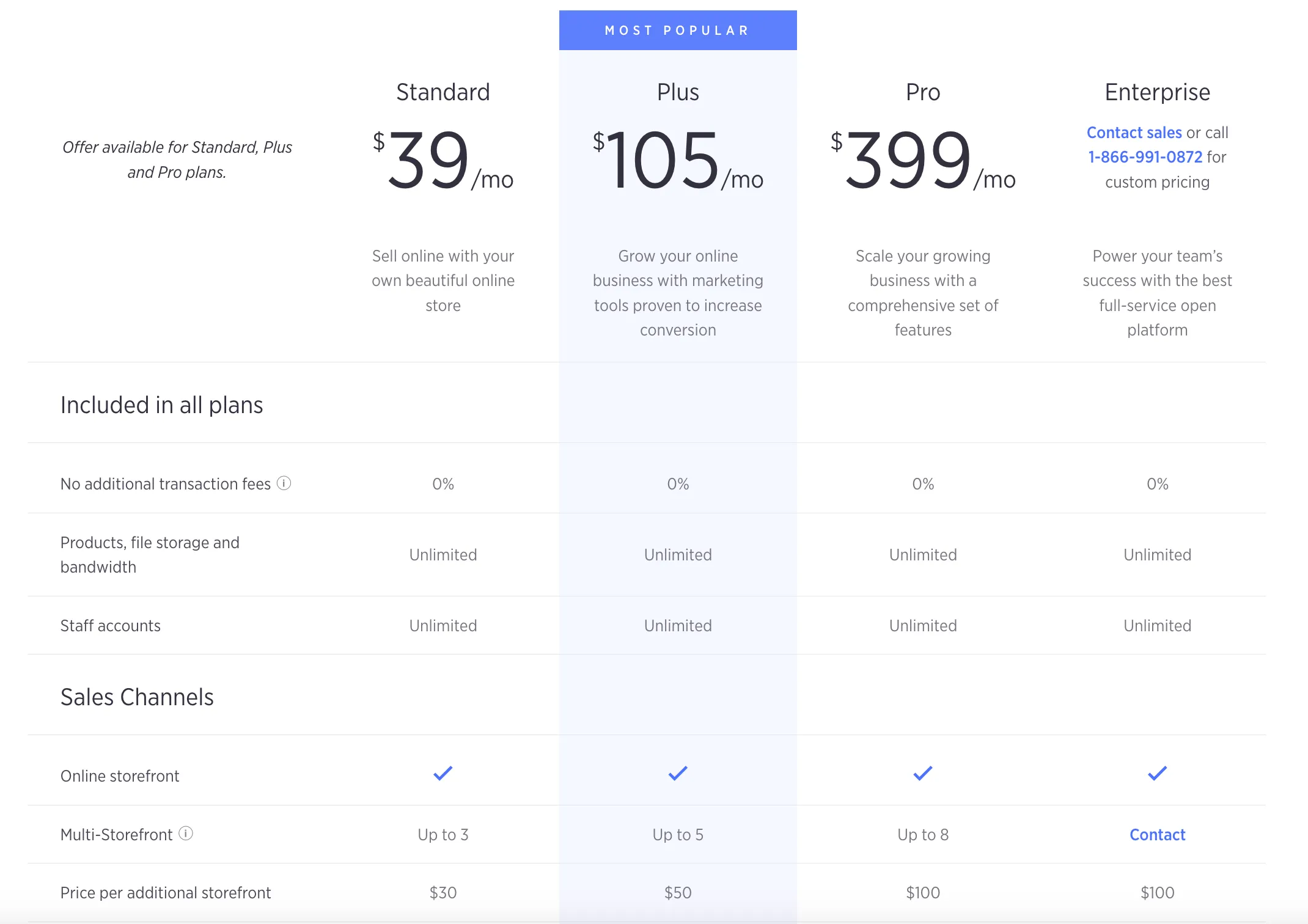
Shopify Pricing & Costs
At the same time, Shopify offers 5 pricing plans:
- Starter: $5/month.
- Basic Shopify: $39/month.
- Shopify: $105/month.
- Advanced Shopify: $399/month.
- Shopify Plus: Pricing varies depending on requirements.
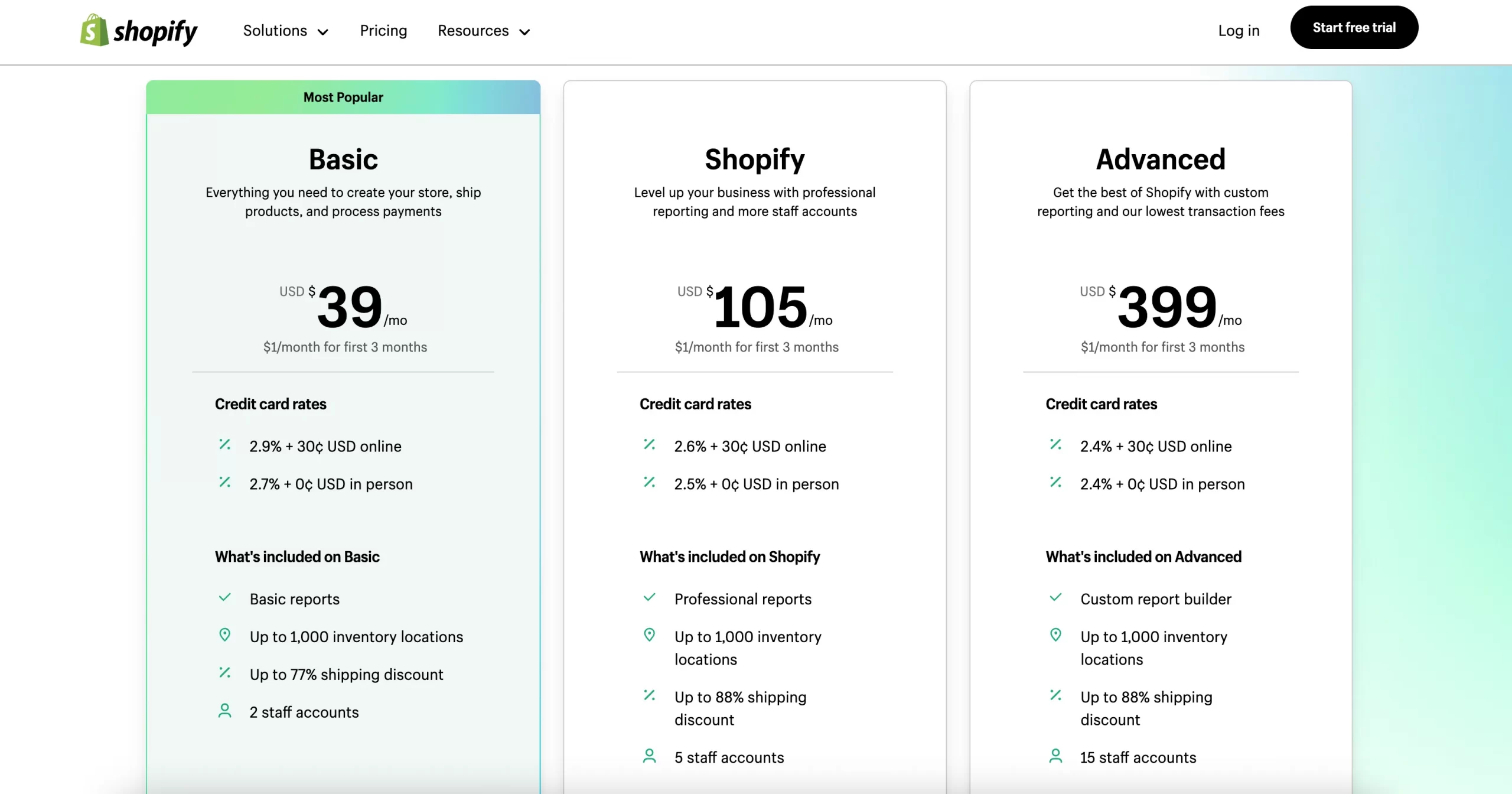
The difference between BigCommerce vs Shopify pricing relies more on the types of features available to each plan. While Shopify offers the abandoned cart recovery feature in the Basic Plan, BigCommerce would only unlock this feature in the Plus Plan. We think this would be extremely advantageous for you.
Additionally, Shopify also comes with an enterprise version called Shopify Plus. LitExtension has compiled a detailed comparison of Shopify Plus vs BigCommerce, so don’t forget to check out this article for more information.
The Verdict
When it comes to BigCommerce vs Shopify price, I believe BigCommerce is the winner. The reason why we chose this platform is that there are no transaction fees, unlimited file storage, product variants, bandwidth, and staff accounts. With Shopify, there will be additional transaction fees and only 15 staff accounts with the Advanced Plan.
2. Ease of Use – Shopify Wins
Ease of use is important not only to beginners but also to experienced eCommerce entrepreneurs. Therefore, we strongly recommend taking it into consideration when comparing BigCommerce vs Shopify.
BigCommerce Ease of Use
BigCommerce was initially designed for owners with not much experience setting up websites.
It is, however, versatile enough for experienced users and developers to modify the code in stores. Therefore, if you’re down to developing from scratch or digging into codes, BigCommerce is the solution you will choose anyway.
It will take you some time to understand how the platform works and start building your store. That said, you can empower your store with out-of-the-box functions to grow your business.
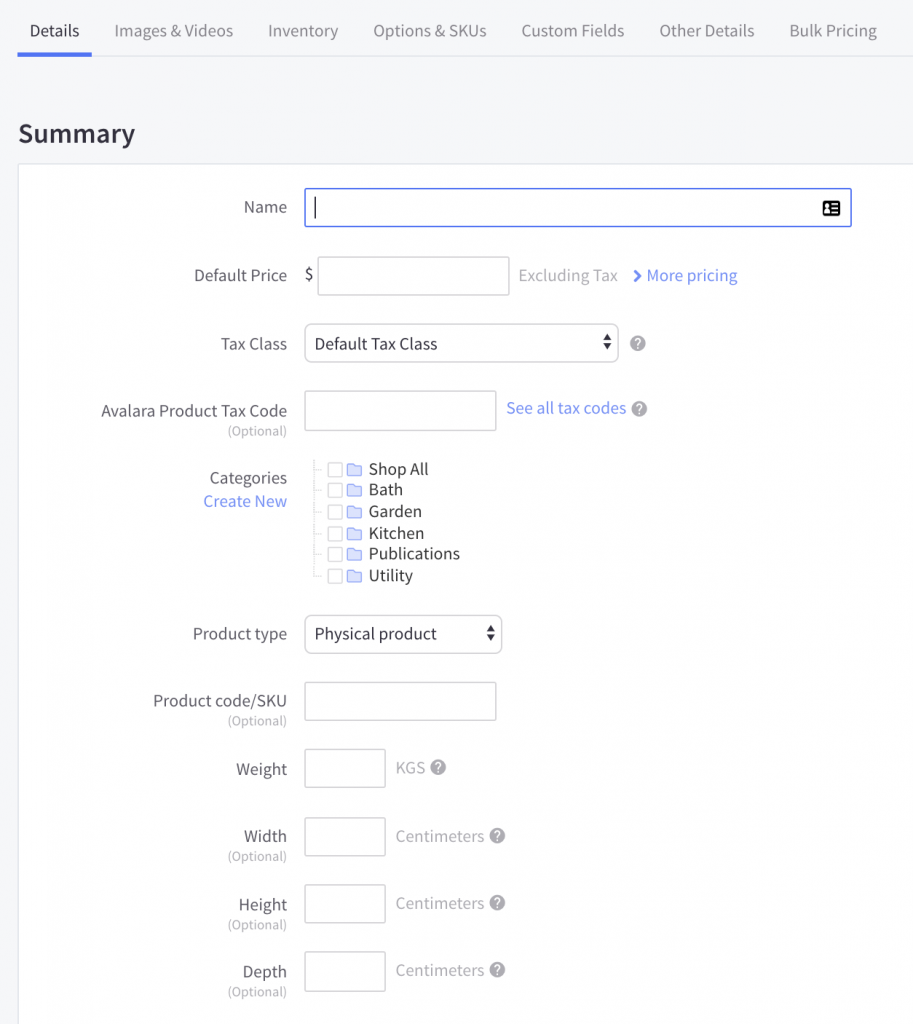
Plus, BigCommerce has recently improved its user interface. Regarding design flexibility, BigCommerce’s drag-and-drop outperforms Shopify, and we just have to grab an element and place it wherever you want. You can start building your store today with this BigCommerce tutorial!
Shopify Ease of Use
Setting up a new Shopify store is easier since Shopify’s dashboard is minimal and easy to navigate.
As Shopify has already built different sections for its users, we only need to follow the in-app instructions to start editing them. We don’t need to get involved in the technical aspect too much and can focus on planning your business strategy.
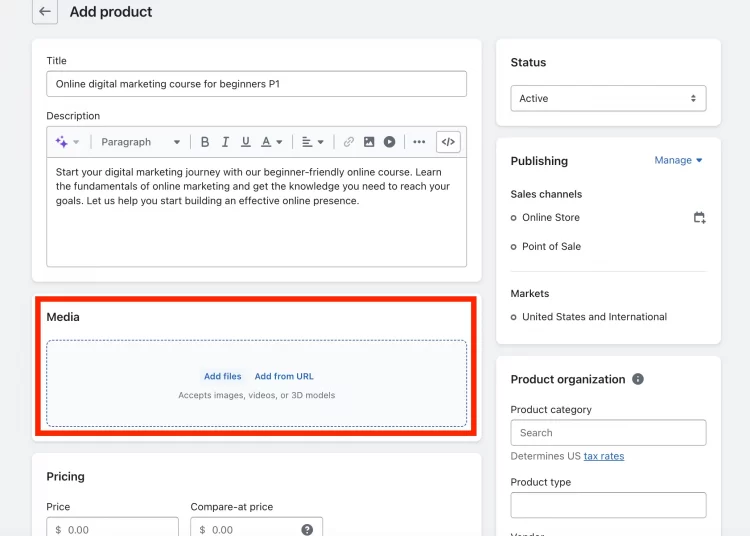
The Verdict
In all honesty, Shopify scores higher in terms of ease of use than BigCommerce. Shopify is praised by most users for its onboarding process and user-friendly editor. We can access every option we need from the left-hand main menu, and there is a nice wizard instructing you to set up your store step by step.
3. Themes & Design – Shopify Wins
Of course, you also want the store to look attractive enough on the front end so customers would have the urge to buy. Here’s what the store design options look like with BigCommerce vs Shopify.
BigCommerce Themes
This eCommerce platform offers different themes sorted by industry, layout, and price on the official theme store. There is a wide range of industries to choose from, although fewer than Shopify.
Free BigCommerce themes are great options for beginners, or you can choose paid ones priced from $150 to $399. In case you don’t know where to start, take a look at the best BigCommerce themes for more inspiration!

Shopify Themes
From the Shopify theme store, you will access a wide range of themes for different industries and styles that vary in price from $100 to $350.
It’s easy to find your perfect theme by searching via layout, size of the store, industry, navigation style, and more. Whether we’re looking at the free vs paid options, all of Shopify’s themes are modern and professional. Shopify’s themes allow superb levels of customization. They’re easy to personalize and look professional.

All of Shopify’s themes are mobile responsive and will automatically reformat to fit the appropriate screen size. You can also edit both versions to your heart’s content, so you can be sure your site looks great on all devices. Shopify even allows a mobile preview in the demo.
If you’re still lost in the ocean of Shopify themes, here we’ve got you a list of 25+ best Shopify themes.
The Verdict
Regarding themes & designs, Shopify wins the battle against BigCommerce because of various modern and mobile responsive themes. Not to mention, it offers the best deal for both free and premium options.
4. Apps & Addons – Shopify Wins
As an eCommerce business grows, having a flexible and customizable platform that can scale with your needs becomes increasingly important. This section examines the app marketplace and scalability options for Shopify comparison to BigCommerce. There are applications available for both BigCommerce vs Shopify.
BigCommerce Apps
Using BigCommerce, you’ll benefit from 1000+ apps from different categories: Accounting & Tax, Checkout, Payment & Security, etc. Here we provide an insightful review of top BigCommerce apps to help users figure out the most suitable apps for their business.
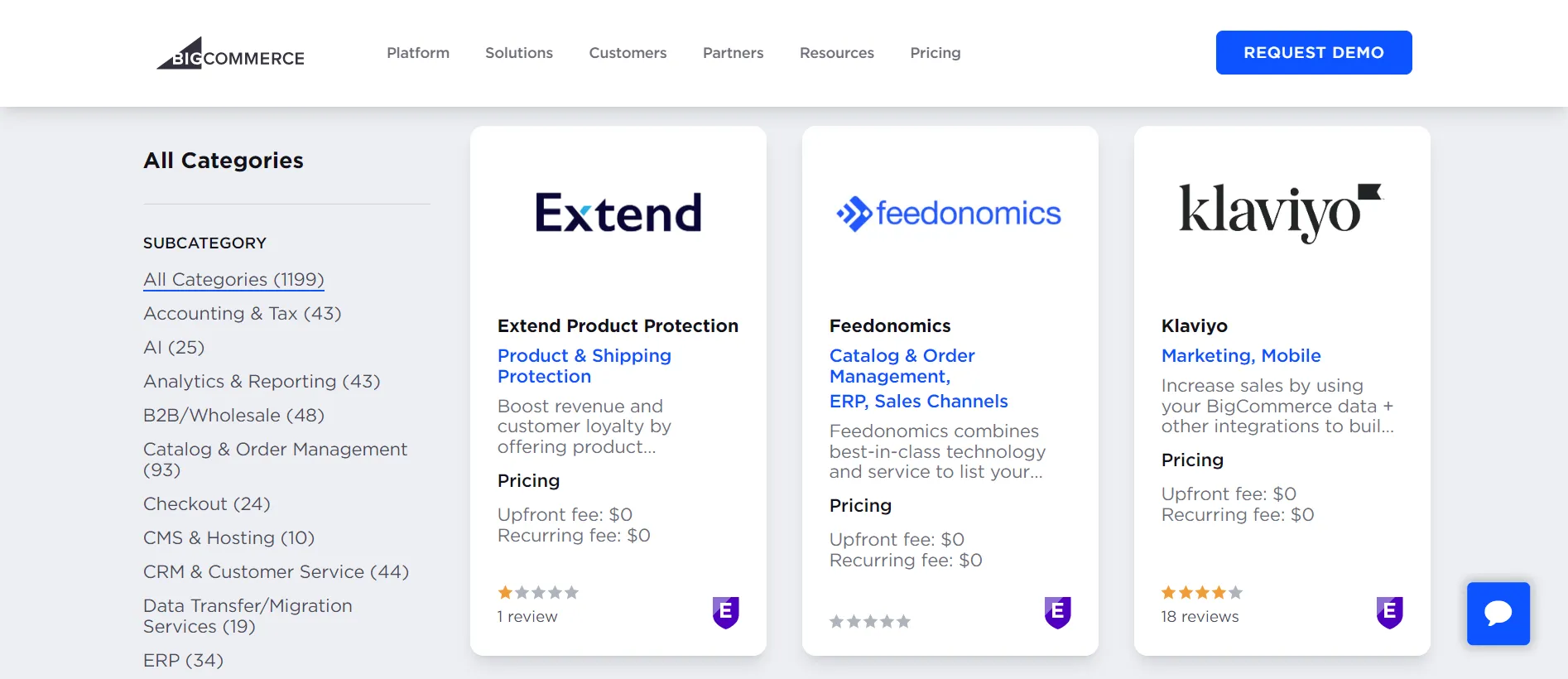
More importantly, BigCommerce has (seriously) powerful built-in features, reducing resource managing third-party apps. Though all plans offer open APIs and 99.99% uptime, its Enterprise Plan delivers a headless solution with unlimited API calls. This deal from BigCommerce definitely enables sellers and developers to outperform in eCommerce.
Lastly, what makes BigCommerce the most scalable platform is the multi-storefront, deep integration with Google products, and custom consulting management.
Shopify Apps
You might be overwhelmed by the amount of 8000+ apps on the Shopify official app store, which makes it the biggest app store on the market.

You can easily navigate to choose the trending apps, new and noteworthy apps, top new apps, and the like. Otherwise, you can explore the categories for more shipping and delivery apps, customization tools, or marketing features. Pick out the best Shopify apps for your store now.
Besides the basic plans, Shopify developed Shopify Plus for stores that are aiming to go global. It offers advanced functionalities and tools that surpass those available on the standard Shopify platform. These include capabilities like multi-channel selling, global expansion, and advanced security measures.
The Verdict
From my point of view, BigCommerce is significantly more favorable vs Shopify for sellers or those who want to scale up their business, especially the Enterprise Plan. It offers limitless possibilities to build, innovate, and grow, thanks to the flexibility and convenience of an open SaaS platform.
5. Payment Gateways – BigCommerce Wins
When we compare Shopify and BigCommerce, it is obvious that both platforms can integrate with almost all third-party gateways like Paypal, Stripe, Square, etc.
What makes the difference is that Shopify comes with its own built-in payment processor. Meanwhile, BigCommerce enables sellers to integrate third-party apps with extra good features. Keep scrolling to learn more about this feature between Shopify vs BigCommerce.
Shopify Payments
Shopify Payments is the in-house payment provider dedicated to sellers on Shopify. Whenever a purchase is made, Shopify Payment takes customers’ money and directly sends it to store owners. Besides, it is packed with a fraud analysis to detect any suspicious activities.

Shopify Payments ensures a quick, smooth, and secure transaction between buyers vs sellers on Shopify. In addition, there are some advantages of Shopify Payment that truly impressed me:
- Instant setup and approval.
- Full integration.
- No extra transaction fees and hidden fees.
Apart from Shopify Payments, Shopify still provides support for 200+ third-party payment gateways based on your store location. However, a transaction fee ranging from 0.5% to 2% is applicable based on the monthly plan you opt for. The transaction fee decreases as you choose higher-tier plans on Shopify.
BigCommerce Payments
In comparison vs Shopify, BigCommerce doesn’t come with a built-in payment processor. Instead, we had to look for payment integrations from the BigCommerce App Store.
BigCommerce offers 50+ payment gateway integrations in over 100+ countries. These can be named Amazon Pay, Paypal, Square, Stripe, Authorize.net, Bolt, etc. All come with excellent features as well:
- No BigCommerce transaction fee.
- PCI Compliance.
- Mobile-optimized.
Bonus fact:
- One of the best additions to the BigCommerce portfolio is multi-currency – which makes it a leading open SaaS platform. You can use pricing lists to customize pricing at a deeper SKU level with this feature. This is something that other market leaders, such as Shopify, do not allow.
- BigCommerce users are able to select payment providers. This is distinct from other tools, which frequently force owners to use the in-built payment for multi-currency tools.
And here’s a visualization answering the question “How does BigCommerce work in terms of payment processing?”:
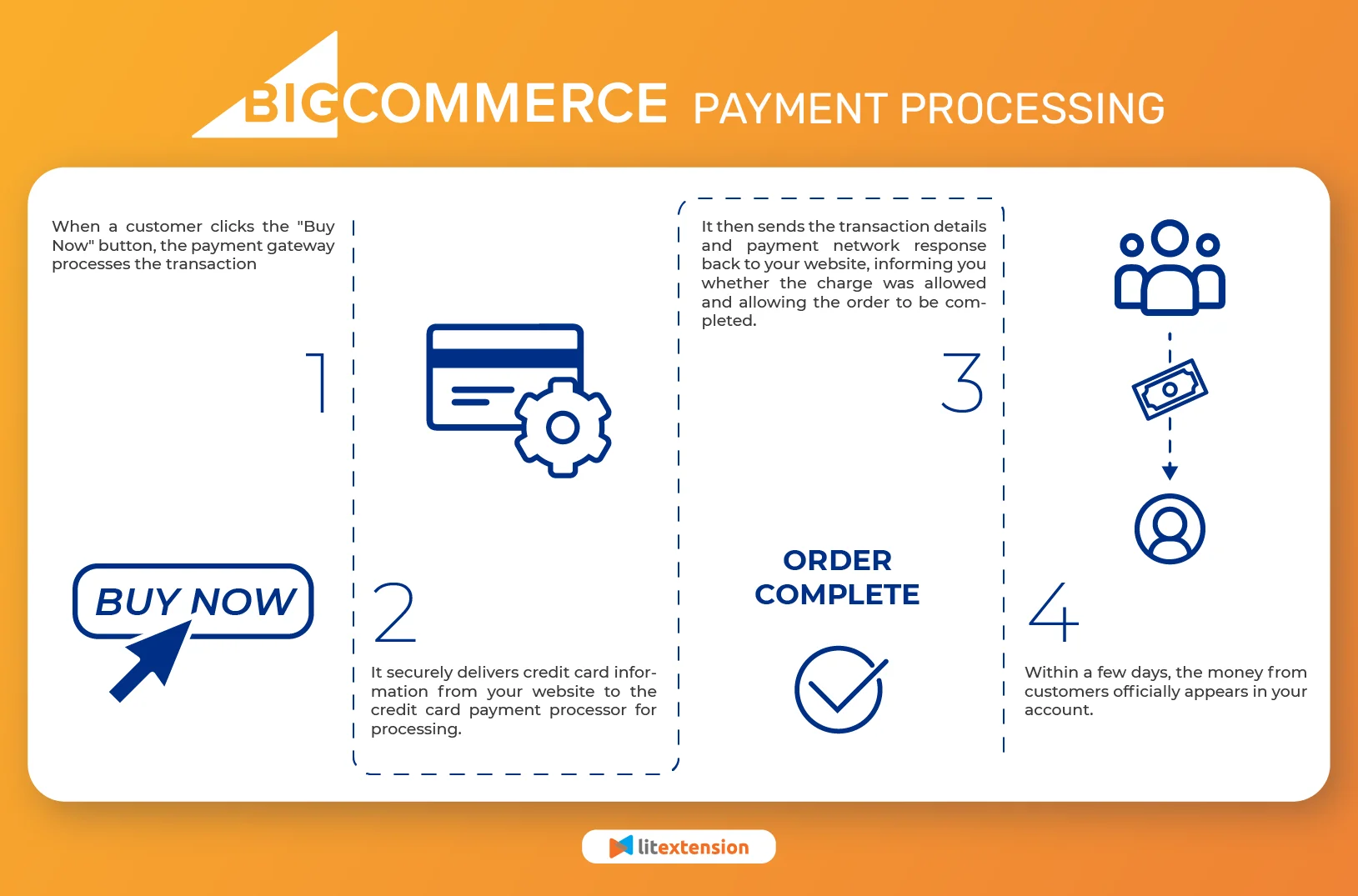
The Verdict
We kind of have a soft spot for BigCommerce when it comes to payment gateways. The biggest reason behind this statement is that there’s no transaction fee at all, while still allowing connections to popular providers. It could save us – the online merchants tons of money!
6. eCommerce Dropshipping – Shopify Wins
The most important thing for drop shippers is to be able to quickly and easily source products from suppliers. Then they can add those products to their stores and have the selling and shipping process automated.
Although BigCommerce vs Shopify apps let you do everything from start to finish, Shopify just has more consistent quality. Oberlo is the one powerful tool that gives Shopify the upper hand for dropshipping.
Shopify Dropshipping
As we perceive it, Shopify’s partnership with Dsers and Dropified is its headline feature for drop shippers.
Dsers is the go-to supplier for a massive selection of goods at wholesale prices. There are many similar apps available on the Shopify app market that focus on different niches, marketplaces, or regions. Because of Shopify’s high curation standards, they’re almost all highly rated and good at what they do.
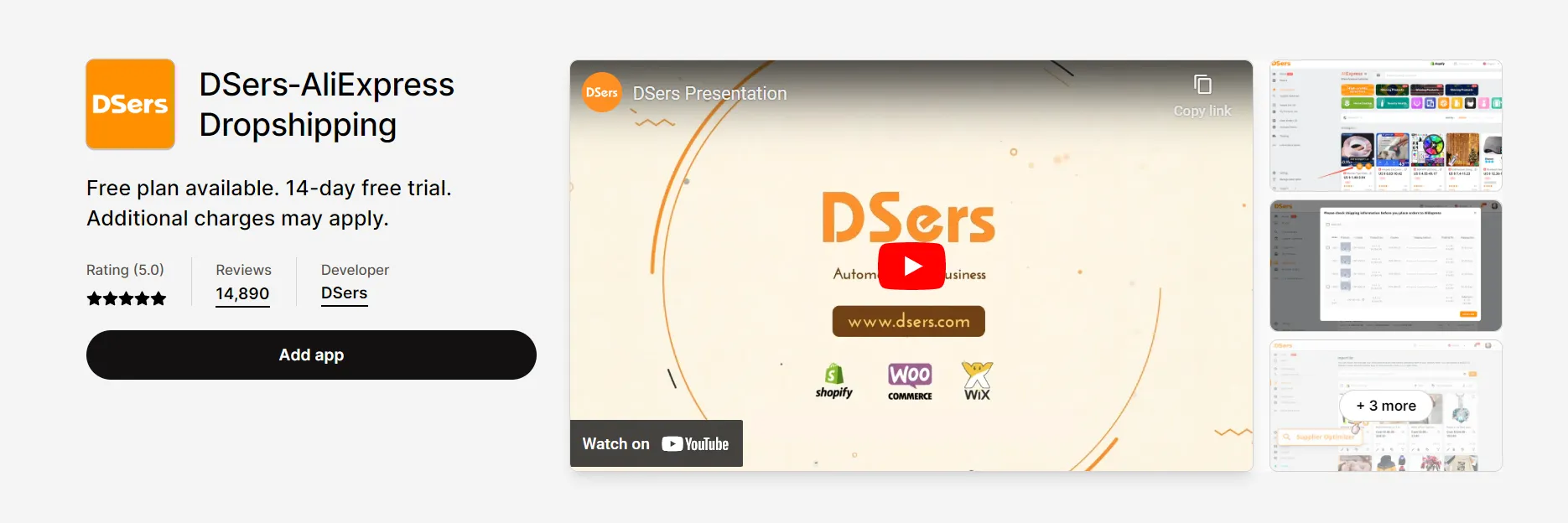
BigCommerce Dropshipping
BigCommerce has a decent app marketplace with a number of great product-sourcing apps. The quality of BigCommerce’s other apps varies differently, and to be honest, a few of them are not as comprehensive as Dsers.
The Verdict
Shopify appears to offer slight advantages for dropshipping through its close supplier relationships and depth of specialized apps – though BigCommerce still supports the model through third-party integrations as well.
7. Sales Features – BigCommerce Wins
Sales features are a must for any online merchant; it is the deciding factor of whether you can generate higher sales with the platform. Fortunately, both BigCommerce vs Shopify have polished this aspect, yet we still have to dig deep into the details.
Inventory management
BigCommerce: Offers a simple, native, and powerful inventory management system to manage stock levels and order trends. It helps keep inventory on track with seamless integration between online and offline channels. Furthermore, BigCommerce features only have already let us sell physical, digital, and service-based products without having to use apps.
Shopify: Shopify’s inventory area allows you to set up inventory tracking, view your inventory, and adjust your inventory counts. It also helps view the history of inventory adjustments for product variants.
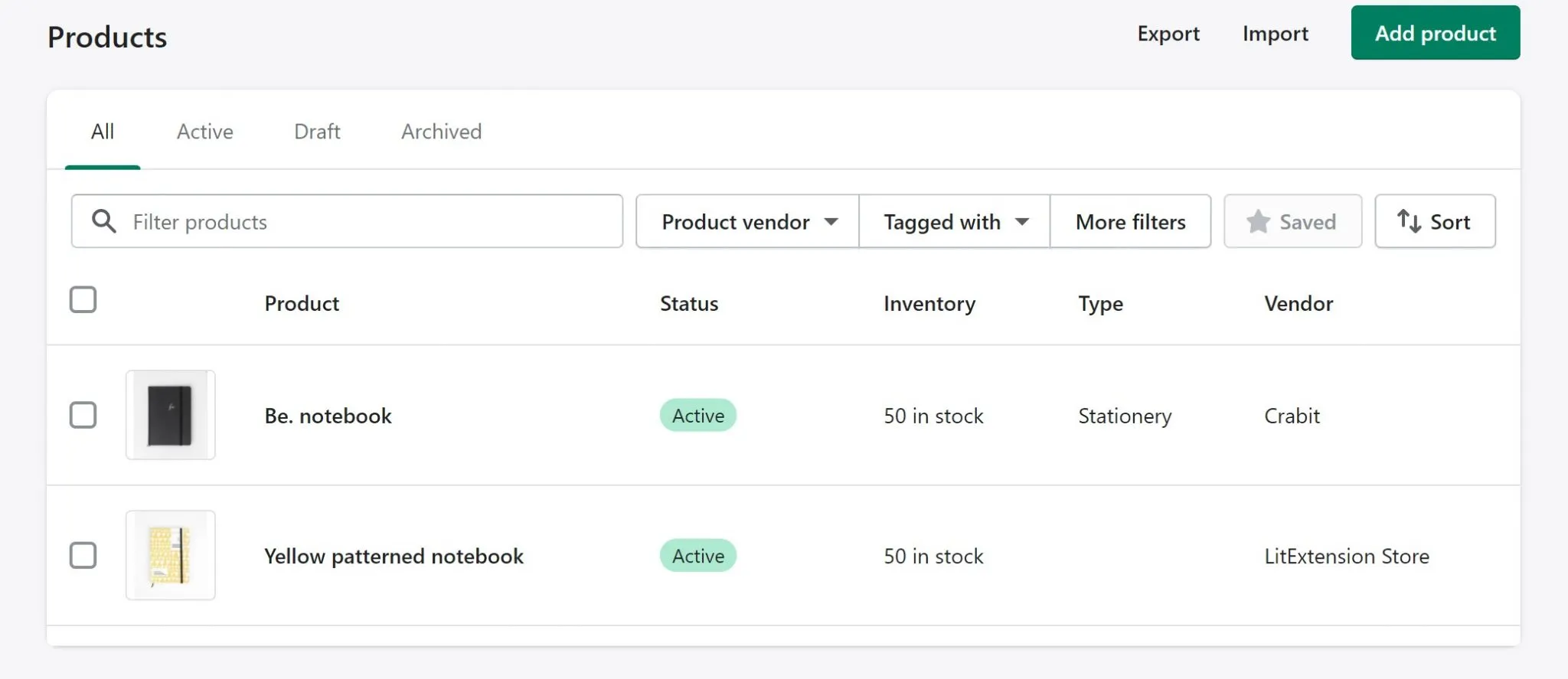
Sales channels
BigCommerce: Channel Manager is designed to help merchants grow sales while making multi-channel selling easier. I could easily connect my store with sales channels and sell on various marketplaces (eBay, Amazon, Walmart, etc.), social channels (i.e., Facebook, Google, etc.), and more.
Shopify: You can use Shopify to sell your products on different online sales channels. By connecting each sales channel to Shopify, we could keep track of the products, orders, and customers in one place. Shopify supports several online sales channels such as Facebook, Amazon, eBay, Instagram, etc.
Point-of-sale (POS)
BigCommerce: Gives you the flexibility to connect with any POS providers (ConnectPOS, Hike, Vend, etc.) and consistently sell online and offline. It helps you manage product catalogs from one location and sync inventory everywhere. And none of this comes with additional fees!
Shopify POS: Provides an application on IOS and Android for a point-of-sale system directly available from Shopify. You can use this to sell your products in person. Kindly read this thorough analysis on Shopify POS to know more about this feature!
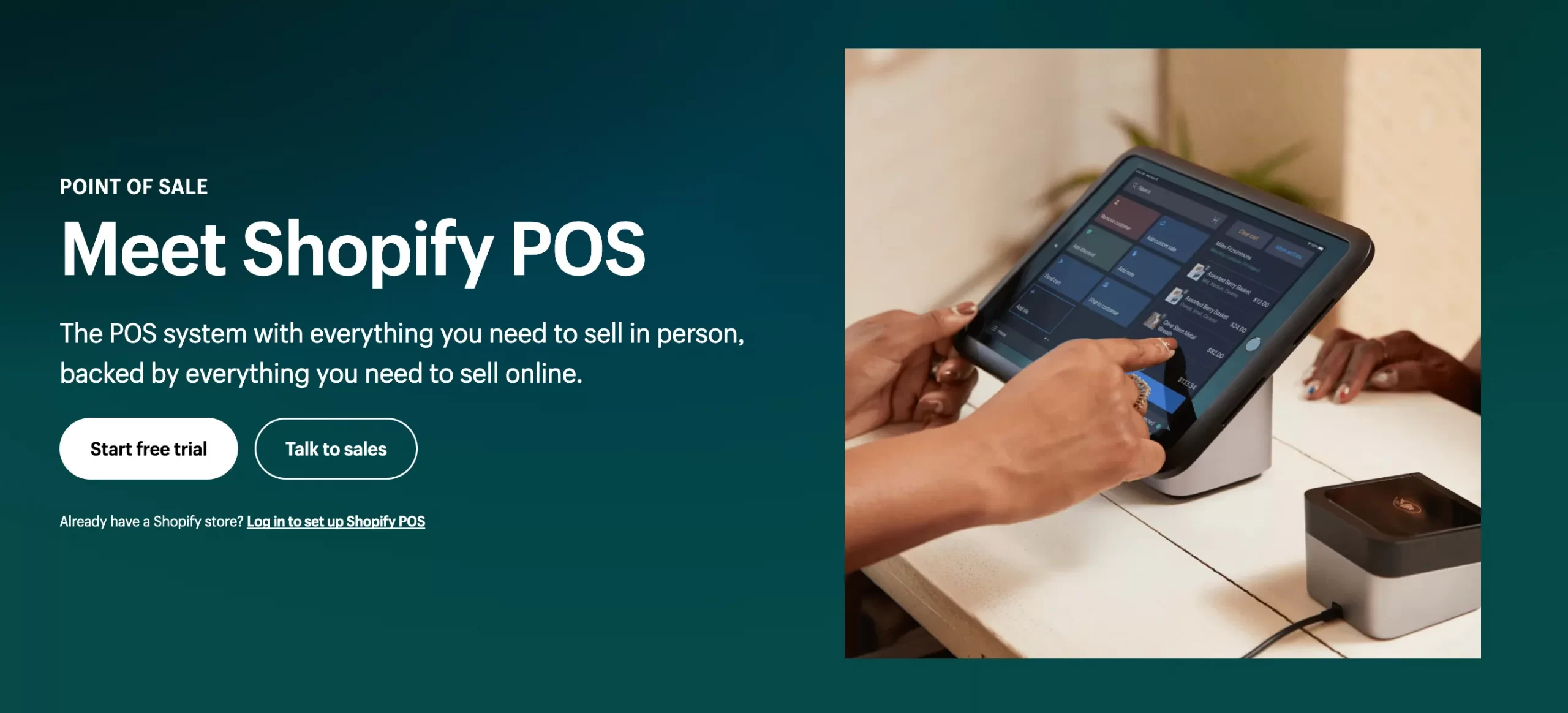
The Verdict
Overall, while both are good options, BigCommerce’s more natively integrated sales features across channels and POS systems may give it a small advantage for companies with complex omnichannel needs. However, Shopify remains highly capable of multi-channel sales and inventory control as well.
8. Marketing Features – Shopify Wins
Marketing tools and functionalities come in handy when it comes to promoting your business. In this round, let’s move to BigCommerce vs Shopify’s marketing features.
BigCommerce Marketing
Approaching customers through email marketing is a decent tactic to help promote products easily. Resultedly, BigCommerce allows you to sync data with leading email platforms: MailChimp, G Suite, and more.
Next, let’s talk about BigCommerce vs Shopify SEO. From what I’ve observed, BigCommerce ensures industry-standard SEO, which is built into all of the BigCommerce sites. The best thing is that we had full control over URLs, title tags, header tags, and metadata. Moreover, 301 redirects in BigCommerce are automatically created whenever the name or the URL of a product, category, or web page is changed.
💡 We’d highly recommend integrating useful marketing applications to expand what you can achieve. For instance, connecting BigCommerce data to a platform like MailChimp allows for more flexible email design.
Shopify Marketing
Shopify email, on the other hand, provides you with built-in tools to build lasting customer relationships. This platform provides ready-made templates for you to choose from and apply right away. We are even able to manage and analyze all marketing activities within your dashboard.
Shopify’s SEO supports on-page optimization with a custom title tag and meta description configuration. It is applied on an easy interface in every product and page editor. 301-redirect is easy to create as well within Shopify and automatically prompts if a page or product URL changes. You can discover more with the Shopify SEO checklist.
The Verdict
Both BigCommerce vs Shopify have a built-in blog, a basic yet very effective tool for content marketing. However, Shopify does offer more for merchants to optimize their sites in search engines.
9. Security – A Tie
Ecommerce site security is critical, specifically when it comes to data protection and sensitivity on a website. The problems can be:
- Safeguarding business finance
- Preventing fraud and financial scams
- Or defending the store’s reputation as a safe place to conduct transactions.
When you set the right security measures for your website, it ensures customers’ privacy and integrity. Following this, they will feel safe buying from you while protecting their data and your online store data.
BigCommerce Security
It’s safe to say that BigCommerce leaves little to nothing to be desired in terms of its approach to security.
As a SaaS, BigCommerce provides multiple layers of strong security for all sites they host. All servers are PCI DSS certified at level 1 to protect against credit card data breaches. Additional security measures include perimeter and server-specific firewalls, file integrity scanners, intrusion detection software, 24/7 human monitoring, and fraudulent transaction protection provided.
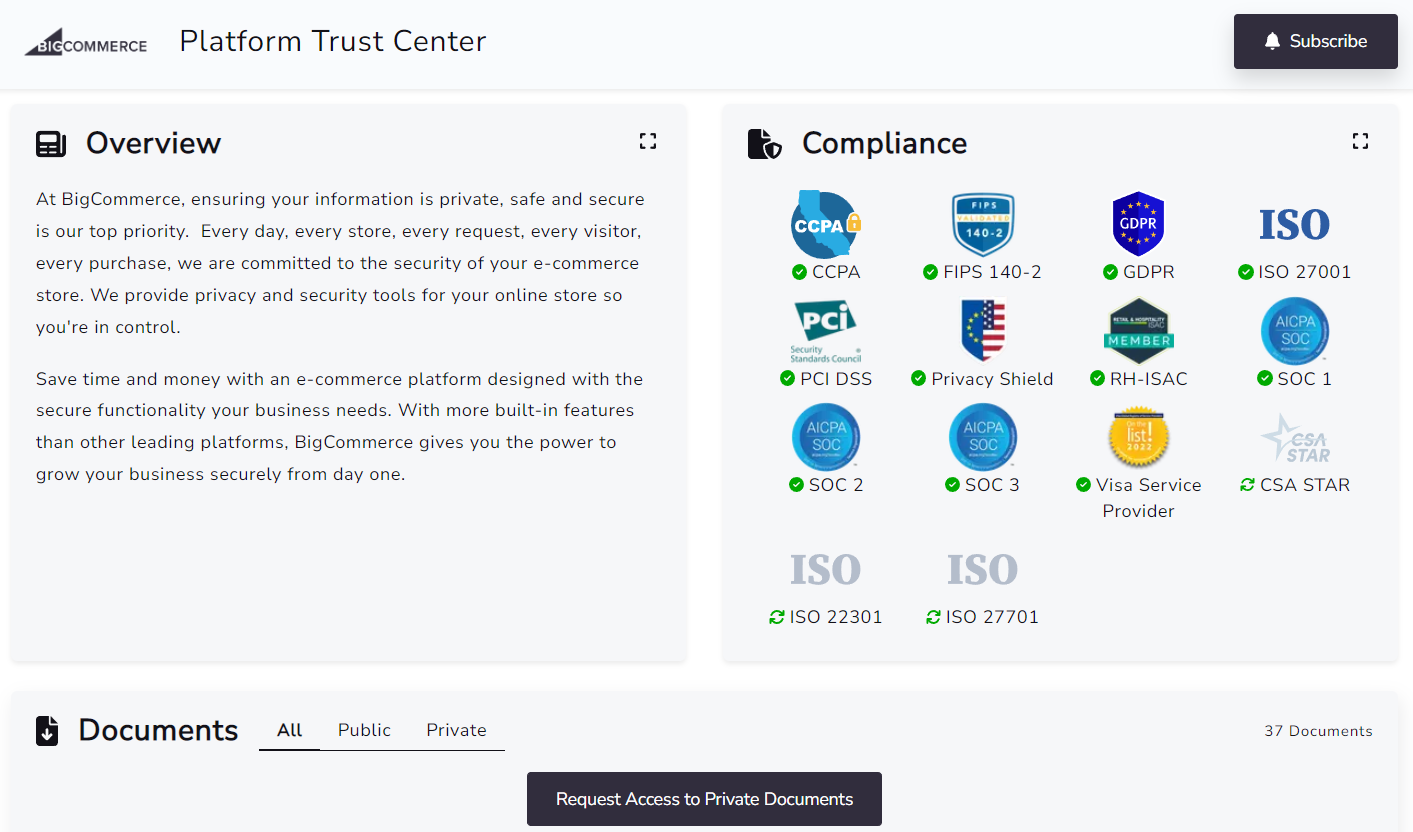
Additionally, you can use an SSL certificate issued by a trusted third party for a specific domain or subdomain. It verifies that a secure web page is properly encrypted, ensuring that all information passed between a user and the site is private.
Shopify Security
Similarly, all of Shopify’s stores are PCI compliant by default to keep your business and customers secure. Thus, you can keep payment info and business data safe.
Shopify provides SSL certificates after adding a custom domain. To improve security, SSL certificates encrypt your store’s content and publish it securely using HTTPS instead of HTTP.
The Verdict
From my point of view, it seems that BigCommerce and Shopify are comparable in terms of security. Both platforms take security seriously and provide multi-layered protection that should satisfy most small- to mid-sized ecommerce businesses.
10. Customer support – BigCommerce Wins
If you want to get the most out of the eCommerce store-building experience, you need to look beyond pricing plans. Having access to tech support is crucial for any business. You never know what kind of problem you might run into.
Hence, in this section, let’s take a look at how BigCommerce vs Shopify provides customer support.
BigCommerce Support
Once you sign up for a BigCommerce free trial, you’ll receive an appointment for a 10-minute call from this platform. By doing this, BigCommerce understands more about your business, and thus they can give better pieces of advice.
Besides, BigCommerce also gives top priority to those who enter the enterprise-level plan. You’ll avail of onboarding consultants and phone calls from highly skillful BigCommerce staff.

Shopify Support
Shopify did a great job in separating detailed sections for the customer support.
In addition to basic customer support like any other eCommerce platforms, Shopify customer service also offers support through social media. When you request help within the Shopify editor, it will direct you to a relevant page within the Shopify knowledge center. This is a great help feature and puts Shopify ahead of BigCommerce in this aspect.
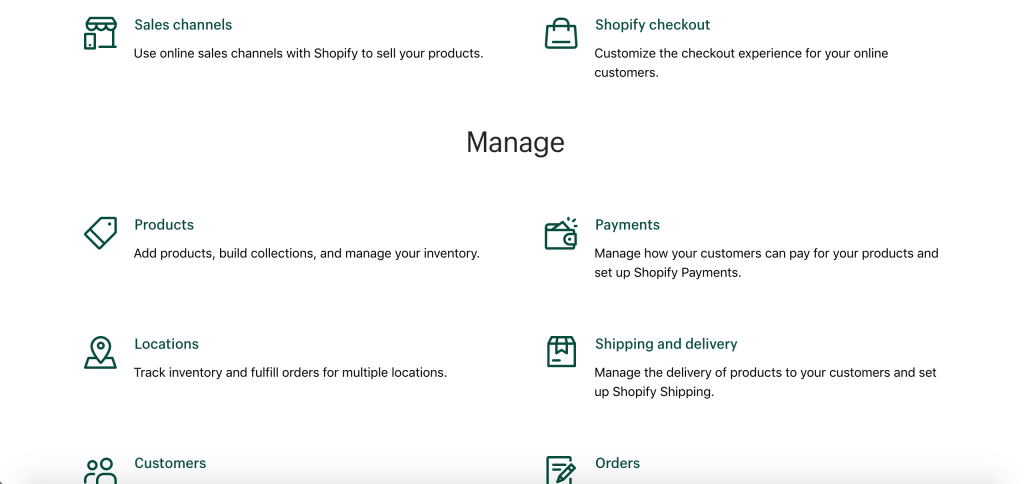
The Verdict
BigCommerce’s help center is useful but less clear than Shopify’s. A more streamlined help center organization and in-app guidance may give it a small advantage, making support issues easier to resolve for Shopify merchants.
Our Methodology
As mentioned above, it’s not easy to evaluate which is better, Shopify vs BigCommerce. Therefore, I have spent over 3 months trying both platforms, carefully putting them to the test, and coming up with this comparison.
Here are my ranking criteria and weighing of each area based on their importance to our readers:
1. Sales and marketing features – 35%
In this criteria, I analyze each platform’s built-in features to see how well it can assist merchants in selling online. Functions like abandoned cart recovery, discount codes, and multi-channel selling capabilities are put into consideration before I come to a conclusion.
2. Themes and customizability – 20%
I evaluate the selection of themes, their ease of use, and the level of customization offered. This helps determine which platform offers a more user-friendly experience for creating a unique and visually appealing online presence that aligns with your brand’s identity.
3. Ease of use – 15%
I believe this is one of the critical factors when comparing BigCommerce vs Shopify because it directly impacts user experience, efficiency, and overall satisfaction. By evaluating this aspect, I want to make sure the platforms can cater to users of varying technical knowledge.
4. Apps and extensions – 10%
No matter how feature-rich a platform is, having a good collection of apps and extensions can certainly enhance a business’s functionalities. Therefore, when choosing between BigCommerce or Shopify, I assess the available apps and extensions to evaluate the platform’s extensibility and its ability to adapt to your specific business needs.
5. Security – 10%
A thorough examination of the platform’s security features helps us ensure the platform can protect customers’ private information. This includes evaluating data encryption standards, access control measures, and the platform’s history of security breaches.
6. Customer support – 5%
A responsive customer support system is crucial for resolving user issues along their selling journey. That’s why customer support is also a criterion that I adopt to compare Shopify vs BigCommerce. This includes the availability of support channels (phone, email, live chat, etc.), the platform’s knowledge base, and the expertise of their support team.
7. User review – 5%
I believe that no one understands a platform better than its users. As a result, when evaluating BigCommerce and Shopify, I also assess other customer reviews on external sources (like Capterra, Trustpilot,…) to see how merchants think of them.
BigCommerceI vs Shopify – FAQs
[sp_easyaccordion id=”47807″]
Final Words
Both BigCommerce vs Shopify are excellent site builders, there’s a lot of overlap between them and that’s the reason why both BigCommerce and Shopify are on my list of best eCommerce platforms. When comparing BigCommerce vs Shopify, it’s hard to pick the final winner. Nevertheless, there are significant differences that can help you choose which one to go with.
In conclusion, the decision may lie in your business direction in the next coming year. Hopefully, this article has given you enough information to help choose the best platform that can cater to your business well.
If you are planning to migrate your platforms to BigCommerce or Shopify, LitExtension – #1 Shopping Cart Migration Expert team is willing to assist! Our team offers the world-leading migration solution with 300,000+ successful migrations for 200,000+ worldwide customers in the last 13 years. Don’t hesitate to contact our support agents to get the utmost assistance.
Please visit LitExtension Blog and join our eCommerce community to grasp even more eCommerce insights.